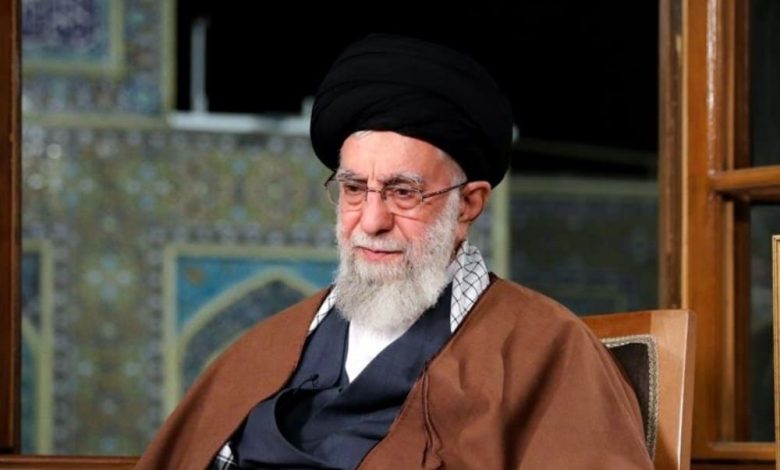Iran: Khamenei Lays Bare His “Regime Change” Fears and Lies in Nowruz Speech

Khamenei
Written by
Mehdi Oghbai
The Iranian regime’s supreme leader, Ali Khamenei, delivered his annual speech on March 21. Aside from his bogus claims of victory and blaming Iran’s social and economic crises on “the enemies,” Khamenei’s speech was an obvious testament to the regime’s deficiencies and crises.
He began his remarks by attacking those regime insiders who have suggested some reforms, such as changing the constitution. “I also speak of reform and change. But this is totally different from what the enemy wants. For example, changing the constitution and the structure of the Islamic system is promoted by lunatics and enemies. Unfortunately, sometimes, some [regime] insiders repeat those words out of negligence or with other purposes. The enemies seek to change the identity of the Islamic Republic,” he said.
Khamenei has failed to quash the nationwide uprising since it erupted in September. The continuation of these protests laid bare his regime’s weakness. Yet, Khamenei didn’t shy away from his usual “power” and self-praising rhetoric.
“What happened on the ground starkly contrasted with what the enemy planned for. The Islamic Republic showed its strength and emerged victorious from a global conspiracy. We slapped those who instigated the riots, supported them, or were provoked to participate in riots,” he claimed.
Yet, he contradicted himself by inviting his thugs and officials to “create hope,” tacitly admitting that morale is faltering in his ranks. “The enemy wants to put out the flame of hope in our youths’ hearts. We should be vigilant about this. My most important advice is to create hope,” he said, trying to boost the morale of his forces, who seem desperate in the face of the growing wave of dissent inside Iran.
Global policy on regime change
Khamenei, whose regime lost every bit of international legitimacy during the nationwide uprising, was right in one instance, nonetheless. He acknowledged that Western powers only tried to “weaken” his regime to exploit concessions from the clerical regime. While the revolution in the making in Iran showed that regime change in Iran is inevitable, Western states have shied from taking concrete steps to support the Iranian people’s desire for regime change.
This became evident in the lack of the European Union’s dithering on placing the Revolutionary Guards (IRGC) on the list of terrorist organizations for its role in the brutal suppression of nationwide protests. It is also shown in the promotion of so-called opposition figures that have no substantial program to overthrow the regime.
In February, while delegations from Tehran were not invited to the Munich Security Conference, particular parties at the MSC invited the son of Iran’s former dictator Reza Pahlavi and his entourage to prevent any misinterpretation that Western powers want regime change. They used the platform to slander Iran’s principal opposition, the Mujahedin-e-Khalq (MEK).
This, however, has not prevented the Iranian Resistance from redoubling its efforts in achieving the dreams of the Iranian people. Inside Iran, the MEK Resistance Units have relentlessly continued their anti-regime activities to keep the flame of resistance alive. Meanwhile, abroad, the NCRI and the supporters of the Iranian Resistance have launched numerous campaigns to condemn the appeasement policy and make sure that the voice of the Iranian people is heard across the globe.
Iran’s Economic Crises
Despite his pathetic efforts, Khamenei couldn’t ignore the country’s worsening economic crises. He debunked the claims by Ebrahim Raisi and his government about “economic progress” and not having a huge budget deficit.
“During the tenure of all presidents, including now, sometimes the budget bill’s revenues do not match the expenses. This causes a budget deficit, which is a huge economic problem,” Khamenei said, adding that “our economic growth has been weak.”
“In [the Persian Year of] 1401, the most important issue for the nation was the issue of the country’s economy, which is directly related to people’s livelihood. People mostly suffered from the bitter taste of inflation and high prices. Especially the high prices of consumer goods and food items. The rising costs of these commodities hurt the lower deciles of the country more,” Khamenei acknowledged.
But the highest authority of the ruling kleptocracy offered no solution and instead called for more plundering of the nation’s wealth by institutions that are directly tied to himself. He claimed that Iran’s economic crises are due to the “state-run economy” and that the “private sector and its activists” should control the “important factories and companies” and “wealth-making productions.” The private sector is Khamenei’s euphemism for the Revolutionary Guards (IRGC) and its economic powerhouses, as well as the major conglomerate the regime’s supreme leader, controls. No private business can get substantial economic power in Iran without being tied to the IRGC.
How the Revolutionary Guards (IRGC) became the sticking point of Iran’s nuclear talks
Khamenei, who controls a $200 billion economic empire and dominates the country’s economy through several institutions and the IRGC, blatantly accused the Iranian people of “wasting” goods.
“Among our people, there are some faults that are related to economic issues. One of them is wastefulness. They waste water, bread, electricity, and gas,” Khamenei said.
Meanwhile, heart-wrenching videos of Iranian children searching for food in garbage or people holding protests asking for their delayed meager wages circulate on the internet.
Ali Khamenei’s speech demonstrated the Iranian regime’s vulnerability and its inability to address the country’s worsening economic situation. Despite Khamenei’s efforts to exude strength and deflect blame onto external forces, his words only highlight the regime’s deep-rooted problems. With growing dissent among the Iranian people, it is only a matter of when rather than if, he remains capable of stiffing the ever-expanding outrage against his reign.

